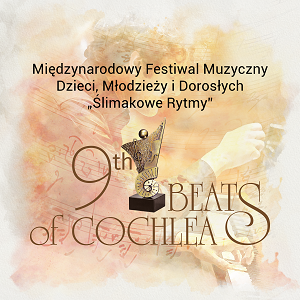9th International Music Festival for Children, Youths, and Adults with Hearing Disorders “Beats of Cochlea”

This year, the International Music Festival “Beats of Cochlea” was held at the World Hearing Center in Kajetany on August 25-26, 2023. The Festival’s rich program aimed to promote music as a therapy for people with hearing impairments. The originator and organizer of the Festival was Prof. Henryk Skarżyński, who, for more than 30 years, has been bringing people back from the world of silence to the world of sounds.
As part of this year’s Festival, participants could participate in music and stage workshops called “Music and Art in Therapy.” Experienced therapists conducted music therapy classes, and there were music therapy activities appropriate for all age groups. There were also art therapy workshops, therapeutic eurhythmics, and songwriting workshops for teenagers.
An important festival event was the 9th Scientific Conference in the “Music in Human Auditory Development” series dedicated this year to “Music and Art in Therapy.” Experts presented lectures on topics related to medicine and therapy versus music and art. There were lectures on music therapy for children with various hearing disorders, music therapy for everyone, therapy based on rhythm and dance, art therapy, diagnostic methods, and rehabilitation in hearing loss, and after hearing implant surgery. Issues of central auditory processing disorders, sound perception, and advances in hearing implants were also discussed.
The Festival participants had the opportunity to learn about the Mobile Laboratories of the Future, where 16 teams of educators conducted workshops using state-of-the-art equipment available at schools through the “Laboratories of the Future” program. The goal was to create a space for the youngest to play, experiment, and develop creative thinking and constructive activities. Participants could discover their natural predispositions and talents and learn teamwork. Educators helped them develop their interests and acquire skills aligned with their particular interests. The Mobile Laboratories of the Future can make children’s – and not only children’s – dreams come true, such as moving into virtual reality or filming with state-of-the-art cameras.
An important part of the Festival was the 1st Education and Training Forum dedicated to the role of teachers, caregivers, and educators in educating children with hearing loss, hearing implant users, and those using hearing aids in kindergartens and schools. Participants discussed their daily functioning in educational institutions, integration problems, and teaching the youngest with hearing problems.
The discussion was the space to analyze the needs of children with hearing impairment and their caregivers, as well as talk about amenities that can make the work of students easier as well as tips for parents, teachers, and educational staff that will support the education and language development of children with hearing impairment. The discussion aimed to develop good practices for educators and teachers and identify opportunities to apply selected amenities in schools and kindergartens.
The closing ceremony of the International Music Festival “Beats of Cochlea” took place during an extraordinary event – the Gala Concert “Where Music Plays.” It was a tribute to the talents of artists with hearing impairment and the wider community of professionals, parents, and caregivers in connection with the 30th anniversary of our identity – from the Cochlear Center (1993 ) to the World Hearing Center (2023).
An extraordinary event celebrating 30 years of work, patients, specialists, and the entire community was a special evening concert of Mr. Bruce Liu, winner of the 18th International Fryderyk Chopin Piano Competition in Warsaw. The artist presented several pieces of Fryderyk Chopin and performed a concerto for four hands with artists – patients of the World Hearing Center. In another part of the concert, guest artists and patients of the World Hearing Center played popular compositions by Polish artists. The winners of this year’s and previous editions of the International Music Festival “Beats of Cochlea” appeared on stage, performing the Festival’s anthem, “The World I Can Hear.”
The 9th International Music Festival for Children, Youths, and Adults with Hearing Disorders “Beats of Cochlea” and other unique events, full of inspiring activities, lectures, and concerts combining the passion for music with concern for the development and well-being of people with hearing disorders are a showcase of our many activities addressing the needs of caring for the collective health of our planet Earth. This is the practical implementation of the WHO’s Global Health and Peace Initiative project.
More information can be found on the Festival website: www.festiwal.ifps.org.pl